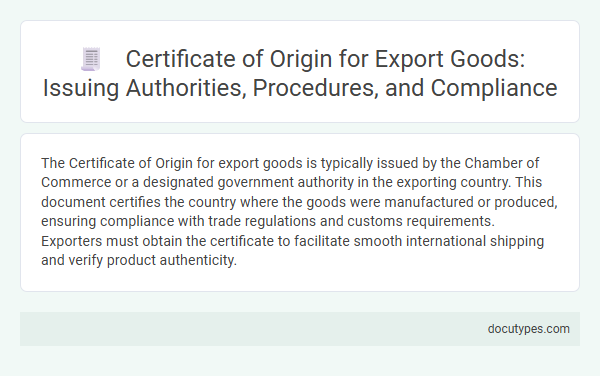The Certificate of Origin for export goods is typically issued by the Chamber of Commerce or a designated government authority in the exporting country. This document certifies the country where the goods were manufactured or produced, ensuring compliance with trade regulations and customs requirements. Exporters must obtain the certificate to facilitate smooth international shipping and verify product authenticity.
Understanding the Certificate of Origin for Export Goods
The Certificate of Origin for export goods is an essential document that verifies where the goods were manufactured or produced. Understanding the authority responsible for issuing this certificate helps ensure compliance with international trade regulations.
- Chambers of Commerce - Most countries delegate the issuance of the Certificate of Origin to local Chambers of Commerce, which authenticate the origin of the products.
- Government Agencies - Certain nations have specific government departments or trade authorities authorized to issue Certificates of Origin for export goods.
- Authorized Exporters - In some cases, registered exporters may self-certify the origin of their goods, subject to regulations and verification.
Importance of Certificate of Origin in International Trade
The Certificate of Origin for export goods is issued by authorized entities such as Chambers of Commerce or designated government agencies. This document verifies the country where the goods were manufactured, playing a crucial role in international trade compliance.
The importance of the Certificate of Origin lies in its ability to determine customs duties and enforce trade agreements, helping to avoid delays or penalties during shipment. It ensures transparency and trust between exporters, importers, and customs authorities. Securing this certificate streamlines your export process and facilitates smoother global transactions.
Key Issuing Authorities for Certificate of Origin
| Authority | Role in Issuing Certificate of Origin | Region or Country |
|---|---|---|
| Chamber of Commerce | Main issuing body responsible for verifying and certifying the origin of export goods. | Global (Common in many countries) |
| Customs Authorities | Sometimes authorized to issue Certificates of Origin, especially for regulated goods. | Various Countries |
| Export Promotion Councils | Authorized to issue Certificates of Origin for specific industry sectors to support exporters. | Countries with export-specific councils (e.g., India, South Africa) |
| Ministry of Commerce or Trade | Government authority overseeing export documentation and issuance of Certificates of Origin in some countries. | Multiple Countries |
Your export goods require a Certificate of Origin issued by these key authorities to comply with international trade regulations.
Types of Certificates of Origin: Preferential vs Non-Preferential
The Certificate of Origin for export goods is typically issued by chambers of commerce or designated export authorities in your country. There are two main types: Preferential Certificates of Origin, which confer reduced tariffs under trade agreements, and Non-Preferential Certificates of Origin, used for standard customs clearance without tariff benefits. Understanding which type applies to your shipment is crucial for compliance and maximizing trade advantages.
Step-by-Step Procedure for Obtaining a Certificate of Origin
The Certificate of Origin for export goods is typically issued by authorized trade bodies such as Chambers of Commerce or customs authorities. This document verifies the country where the goods were manufactured or produced, crucial for international trade compliance.
To obtain a Certificate of Origin, exporters must first prepare the necessary documents, including invoices, packing lists, and shipping details. The next step involves submitting these documents along with the application form to the designated issuing authority.
Once the application is received, the authority will review the documents to verify the origin claim and ensure all information is accurate. Upon successful verification, the Certificate of Origin will be officially issued to the exporter for use in customs clearance and export procedures.
In some countries, exporters may need to register online or in person with the issuing body before applying. Processing times and fees vary depending on the issuing authority and the complexity of the export goods involved.
Required Documentation for Certificate of Origin Application
Which authority issues the Certificate of Origin for export goods? The Certificate of Origin is typically issued by authorized chambers of commerce or government export agencies. These authorities verify the origin of goods to facilitate international trade compliance.
What documentation is required for a Certificate of Origin application? Applicants must submit a commercial invoice, packing list, and export declaration. Proof of origin documents such as bills of materials or manufacturing records are also essential for verification.
Compliance Standards and Regulatory Requirements
The Certificate of Origin for export goods is issued by authorized government agencies or chambers of commerce. These entities ensure compliance with international trade regulations and verify the origin of products to facilitate customs clearance.
- Government Customs Authorities - Responsible for validating export documentation in line with national trade policies and regulatory frameworks.
- Chambers of Commerce - Accredited bodies that certify product origin based on strict compliance with trade agreement requirements.
- Regulatory Compliance - Certificates must meet standards set by trade agreements, such as WTO rules or bilateral treaties, to ensure legal export procedures.
Common Errors and How to Avoid Them
The Certificate of Origin for export goods is typically issued by authorized bodies such as Chambers of Commerce or Trade Associations recognized by the exporting country. Common errors include incorrect product descriptions, mismatched consignment details, and missing signatures, which can cause customs clearance delays. You can avoid these issues by carefully verifying all information against shipping documents and consulting the issuing authority's guidelines before submission.
Digitalization and Electronic Certificate of Origin
The certificate of origin for export goods is typically issued by authorized chambers of commerce or designated government agencies. These authorities verify the origin of the goods to ensure compliance with international trade agreements and regulations.
Digitalization has transformed this process, enabling the issuance of electronic certificates of origin (eCOs) through secure online platforms. Your export transactions benefit from faster processing times and reduced paperwork, enhancing efficiency and accuracy in global trade documentation.
Which Authority Issues Certificate of Origin for Export Goods? Infographic

